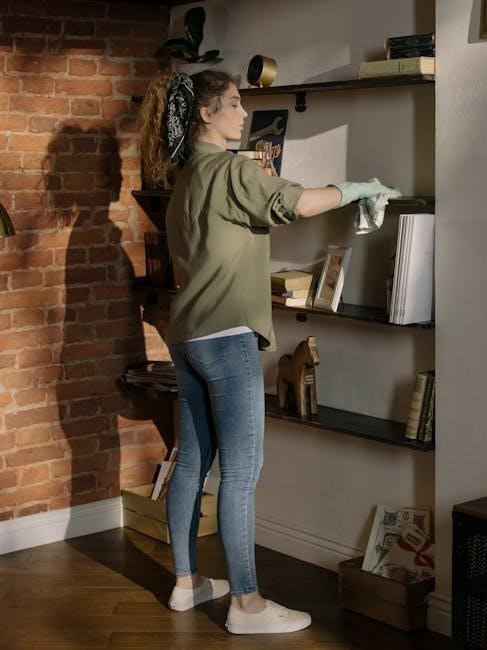Marilynne Robinson’s Housekeeping is a poignant exploration of loss, identity, and resilience set in the isolated town of Fingerbone; This hauntingly beautiful novel, her debut, weaves a tale of two sisters navigating life’s challenges. Its profound themes and lyrical prose have made it a classic, widely available in PDF format for readers worldwide.
1.1 Overview of the Novel
Housekeeping by Marilynne Robinson is a haunting tale of two sisters, Ruth and Lucille, growing up in the isolated town of Fingerbone. The novel explores their journey through loss, identity, and survival under the care of their grandmother, great-aunts, and later, their eccentric aunt Sylvie. Set against the backdrop of a glacial lake and a tragic family history, the story delves into themes of transience, resilience, and the enduring power of human connection.
1.2 Historical Context and Publication Details
Housekeeping, Marilynne Robinson’s debut novel, was published in 1980 to critical acclaim. Set in the fictional town of Fingerbone, the story explores universal themes of loss, identity, and survival. The novel won the PEN/Hemingway Award, establishing Robinson as a prominent literary voice. Its timeless narrative and evocative prose continue to resonate with readers, making it a cherished classic in contemporary literature.
Author Background and Other Works
Marilynne Robinson, a Pulitzer Prize-winning author, is known for her profound exploration of faith, identity, and rural life. Her other notable works include Gilead and Home.
2.1 Marilynne Robinson’s Literary Career
Marilynne Robinson’s literary career began with her debut novel Housekeeping in 1980, earning the PEN/Hemingway Award. She gained acclaim for Gilead (2004), winning the Pulitzer Prize, and Home (2008), which claimed the Orange Prize. Robinson’s works explore themes of faith, identity, and rural life, solidifying her reputation as a masterful storyteller and intellectual voice in contemporary literature.
2.2 Her Notable Works and Awards
Marilynne Robinson’s notable works include Housekeeping, Gilead, and Home. She received the Pulitzer Prize for Gilead and the Orange Prize for Home. Her nonfiction includes essays on religion and science, showcasing her intellectual range. Robinson’s honors also include the National Humanities Medal and being named one of Time’s 100 most influential people, reflecting her significant impact on American literature.

Setting: The Significance of Fingerbone
Fingerbone, a small, isolated town in Idaho, is set on a glacial lake with a tragic history, creating a haunting and melancholic backdrop for the story.
3.1 Description of Fingerbone and Its Isolation
Fingerbone, a small, remote town in Idaho, is nestled beside a glacial lake, its isolation amplified by snow-covered mountains and harsh weather. The town’s history is marked by tragedy, including a catastrophic train wreck and the death of Ruth and Lucille’s mother. Its vast, untouched landscape evokes a sense of melancholy and detachment, mirroring the emotional isolation of its inhabitants, particularly the sisters as they navigate their fractured lives;
3.2 The Role of the Glacial Lake and Train Wreck
The glacial lake in Housekeeping serves as a central, almost animate presence, its serene yet foreboding nature mirroring the emotional depths of the characters. The train wreck, a tragic event in Fingerbone’s history, claimed the life of Ruth and Lucille’s grandfather, casting a shadow over the town. These elements symbolize the fragility of life and the enduring impact of loss, shaping the novel’s haunting atmosphere and themes of memory and resilience.

Major Themes in “Housekeeping”
Housekeeping explores themes of loss, identity, and transience, delving into the resilience of the human spirit amidst life’s uncertainties and the fleeting nature of existence.
4.1 Exploring Loss and Identity
In Housekeeping, Marilynne Robinson masterfully explores the intertwined themes of loss and identity through Ruth and Lucille’s journey. The sisters grapple with the absence of their mother and grandmother, navigating a fragile sense of self. Their experiences in the isolated town of Fingerbone, shaped by tragedy and isolation, reveal how loss profoundly influences identity. Ruth’s introspective narrative captures the complexity of grief and self-discovery, while the town’s eerie solitude amplifies their emotional detachment, highlighting the struggle to find belonging in a world marked by absence and transience.
4.2 The Concept of Transience and Survival
Transience and survival are central themes in Housekeeping, as Ruth and Lucille confront the fleeting nature of life and the resilience required to endure. The glacial lake and train wreck symbolize the fragile balance between permanence and impermanence. Their aunt Sylvie’s nomadic lifestyle embodies the idea of living with flux, while the town’s precarious existence reflects humanity’s struggle to survive amidst nature’s indifference. This duality underscores the novel’s exploration of adaptation and perseverance.
Narrative Structure and Storytelling
Ruth’s introspective narrative voice and the novel’s non-linear storytelling create a lyrical, philosophical atmosphere, reflecting themes of loss and identity through a deeply personal and contemplative lens.
5.1 The Protagonist’s Narrative Voice
Ruth’s narrative voice in Housekeeping is introspective and lyrical, offering a deeply personal perspective on loss, identity, and resilience. Her storytelling is both contemplative and poetic, weaving together fragments of memory and emotion. The voice is uniquely suited to the novel’s themes of transience and survival, creating a meditative atmosphere that draws readers into the world of Fingerbone. Ruth’s reflections, though often abstract, resonate with profound clarity and emotional depth, shaping the novel’s ethereal tone.
5.2 The Power of Storytelling in the Novel
Storytelling in Housekeeping serves as both a survival mechanism and a means of grappling with existential questions. Ruth’s narration is a testament to the enduring power of storytelling, weaving fragmented memories into a cohesive narrative that reflects the transience of life. The novel underscores how stories not only preserve identity but also provide solace, illuminating the human struggle to find meaning amidst loss and uncertainty.

Character Analysis: Ruth and Lucille
Ruth and Lucille, sisters in Housekeeping, embody contrasting responses to loss. Ruth’s introspective nature and Lucille’s practicality highlight their evolving bond and individual growth amid tragedy.
6.1 The Sisters’ Journey and Development
Ruth and Lucille’s journey in Housekeeping is marked by their unique responses to loss and abandonment. Ruth’s narrative voice reflects her deep emotional engagement, while Lucille’s growing independence signifies her struggle with identity. Their relationship evolves from childhood dependence to a complex interplay of loyalty and divergence, shaped by the absence of stable maternal figures. Their paths reveal the resilience and fragility of sisterly bonds. Available in PDF format for deeper exploration.
6.2 The Role of Aunt Sylvie
Aunt Sylvie, with her eccentric and detached demeanor, becomes a pivotal figure in Ruth and Lucille’s lives. Her unconventional lifestyle, marked by a disregard for traditional norms, profoundly influences Ruth, fostering a sense of acceptance and resilience. Sylvie’s presence embodies the novel’s themes of transience and survival, offering a unique perspective on life’s unpredictability and the freedom to escape societal expectations. Her character adds depth to the narrative, shaping Ruth’s worldview. Available in PDF for further insight.

Influence of Henry David Thoreau
Marilynne Robinson draws inspiration from Thoreau’s transcendentalism, reflecting themes of solitude, nature, and self-sufficiency in Housekeeping. His reverence for natural landscapes mirrors Fingerbone’s isolation, available in PDF for deeper exploration.
7.1 Transcendentalism in the Novel
Housekeeping reflects Thoreauvian transcendentalism through its emphasis on nature’s spirituality and individualism. The isolated town of Fingerbone, with its glacial lake and tragic history, serves as a backdrop for exploring themes of solitude and self-reliance. Robinson’s prose often mirrors Thoreau’s reverence for natural landscapes, suggesting a deeper connection between human existence and the ethereal beauty of the world. This philosophical undertone enriches the novel’s emotional depth.
7.2 Emersonian Metaphors in “Housekeeping”
Housekeeping embodies Emersonian metaphors through its portrayal of nature as a mirror of the human soul. The glacial lake and the crumbling family house symbolize the transience of life and the search for meaning. Robinson’s lyrical descriptions of Fingerbone’s landscape evoke Emerson’s belief in nature as a source of spiritual insight, reflecting the characters’ inner worlds and their journey toward self-discovery and renewal. This metaphorical richness enhances the novel’s philosophical depth.

The Role of Nature
Nature in Housekeeping serves as both a backdrop and a character, shaping the lives of Ruth and Lucille. The glacial lake and Fingerbone’s isolation underscore themes of beauty, loss, and resilience, while the ever-changing landscape mirrors the sisters’ emotional journeys, emphasizing the interconnectedness of human and natural worlds.
8.1 Nature as a Character in the Novel
In Housekeeping, nature is a central, animate force, shaping the lives of Ruth and Lucille. The glacial lake, with its mysterious depths, and the encroaching wilderness of Fingerbone, serve as both a backdrop and a character, influencing the sisters’ journeys. The lake’s tranquility contrasts with its deadly history, symbolizing the duality of beauty and danger. Nature’s presence is constant, mirroring the characters’ emotional states and underscoring the fragility of human existence.
8.2 Symbolism of the Natural Landscape
The natural landscape in Housekeeping serves as a rich tapestry of symbolism, reflecting the characters’ inner worlds. The glacial lake embodies loss and memory, while the surrounding wilderness signifies isolation and resilience. Seasonal changes mirror the sisters’ emotional transitions, with winter’s austerity contrasting summer’s vitality. The landscape, ever-present and evolving, becomes a metaphor for transience and survival, central themes of the novel.
Literary Style and Language
Marilynne Robinson’s prose in Housekeeping is lyrical and evocative, creating an ethereal atmosphere through meticulous descriptions of nature and introspective dialogue, mirroring the novel’s thematic depth.
9.1 Descriptive Writing and Ethereal Atmosphere
Marilynne Robinson’s Housekeeping is renowned for its lyrical prose and evocative descriptions, crafting an ethereal atmosphere. The novel’s vivid depictions of Fingerbone’s glacial lake and train wreck create a hauntingly beautiful backdrop. Robinson’s meticulous attention to natural details immerses readers in the setting, mirroring the introspective tone of the narrative. This descriptive richness enhances the novel’s exploration of loss, identity, and resilience, leaving a lasting impression on readers.
9.2 Unique Narrative Techniques
Housekeeping employs a non-linear narrative structure, blending past and present seamlessly. Ruth’s introspective voice offers a deeply personal perspective, while the novel’s use of metaphor and symbolism adds layers of meaning. Robinson’s technique of juxtaposing the mundane with the profound creates a unique reading experience, drawing readers into the sisters’ world. This narrative approach underscores the novel’s themes of memory, identity, and the power of storytelling.

Reception and Awards
Housekeeping earned the PEN/Hemingway Award and was a Pulitzer Prize finalist. Critics praised its lyrical prose and profound themes, solidifying its status as a modern classic.
10.1 Critical Acclaim and Reviews
Critics praised Housekeeping for its lyrical prose and profound exploration of loss, identity, and resilience. Reviewers noted its transcendental elements and haunting atmosphere, with many calling it a modern classic. The novel’s unique narrative style and ethereal descriptions were particularly highlighted, showcasing Robinson’s mastery of language. Its reception solidified her reputation as a major literary voice, earning widespread acclaim and admiration.
10.2 The Novel’s Impact and Legacy
Housekeeping has left a lasting impact on contemporary literature, solidifying Marilynne Robinson’s reputation as a masterful storyteller. Its exploration of loss, identity, and resilience resonated deeply with readers, making it a beloved classic. The novel’s influence extends beyond its pages, inspiring writers and scholars alike. Its ethereal prose and profound themes continue to be celebrated, ensuring its enduring legacy in modern literary history.

The Ending and Its Significance
The ending of Housekeeping leaves readers with a poignant reflection on transience and resilience. Ruth’s quiet acceptance of uncertainty mirrors the novel’s themes of loss and survival, emphasizing the enduring strength of the human spirit.
11.1 Interpretation of the Conclusion
The conclusion of Housekeeping offers a profound reflection on resilience and acceptance. Ruth’s quiet resolve underscores the novel’s themes of loss, identity, and survival. The ending, though ambiguous, suggests a harmonious coexistence with life’s uncertainties, leaving readers with a sense of hope amidst transience and the enduring power of human adaptability.
11.2 Themes Reinforced by the Ending
The ending underscores the themes of resilience and acceptance, as seen through Ruth’s quiet determination. The sisters’ ability to adapt despite their losses reflects the novel’s exploration of survival and identity. The conclusion reinforces the idea that life’s meaning is found in the journey, not the destination, highlighting the enduring power of human adaptability. The isolated setting of Fingerbone, with its harsh natural elements, further emphasizes these themes, showcasing how external challenges mirror internal struggles.

“Housekeeping” in PDF Format
Housekeeping by Marilynne Robinson is widely available in PDF format, offering readers a convenient way to access this timeless story of resilience and identity. The digital version ensures easy readability across devices, making it a popular choice for modern readers seeking a profound literary experience.
12.1 Availability and Features
Marilynne Robinson’s Housekeeping is readily available in PDF format from major eBook platforms. The digital version offers adjustable font sizes, bookmarking, and search functionality. It includes a table of contents for easy navigation. The PDF is compatible with various devices, ensuring readers can enjoy the novel on e-readers, tablets, or smartphones. Additionally, many versions support annotations, enhancing the reading experience for students and book clubs alike.
12.2 Reading the Novel in Digital Format
Reading Housekeeping in PDF format offers a convenient and immersive experience. The digital version allows readers to access the novel on multiple devices, ensuring portability and ease of reading. With adjustable font sizes and night modes, the text remains clear and readable in various settings. The PDF format also enables quick searches and annotations, making it ideal for both casual readers and academic studies. This accessibility enhances the novel’s timeless appeal to a broader audience.
